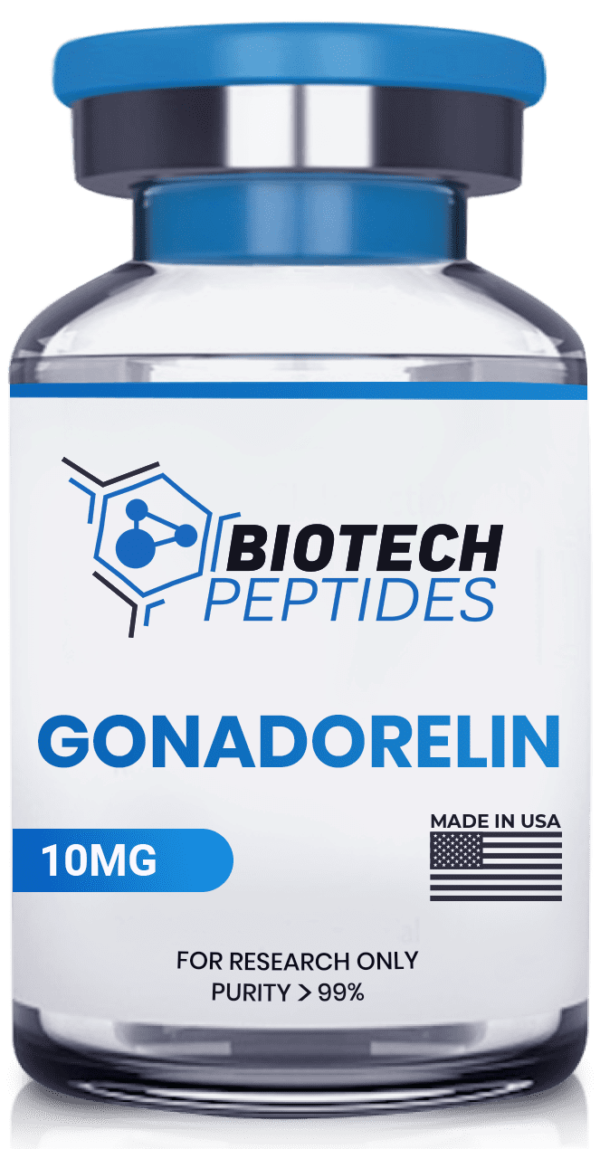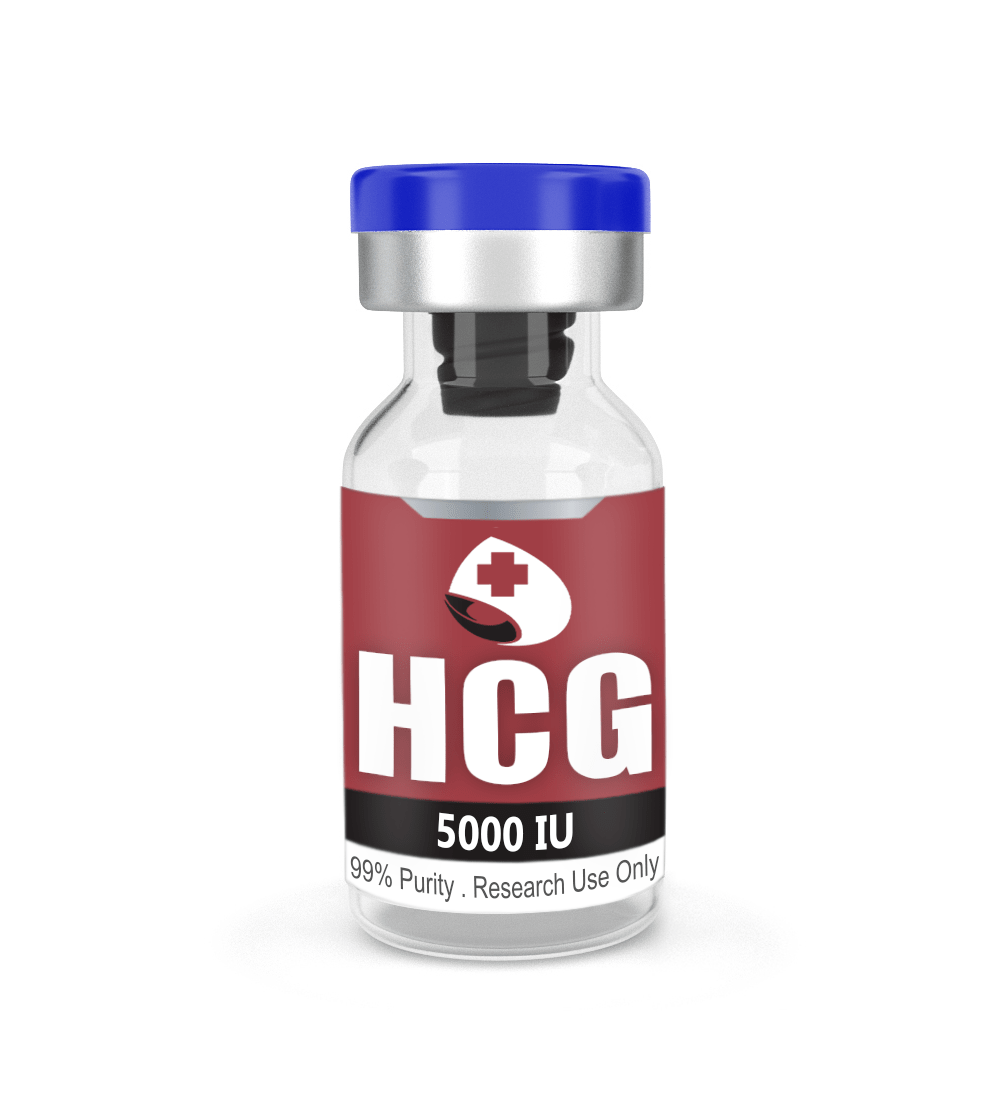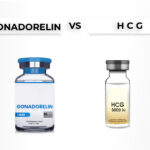
Gonadorelin and HCG present as key hormonal agents, each with its unique benefits, uses, and side effects, bringing us to the crucial topic of Gonadorelin vs HCG.
Both play pivotal roles in the realms of fertility and hormonal balance but operate via different mechanisms and have varying applications.
Gonadorelin excels in stimulating the release of gonadotropin hormones, pivotal for regulating fertility and addressing conditions like infertility and certain hormonal imbalances.
Conversely, HCG, or human chorionic gonadotropin, has a broader utility range—aiding in fertility treatments, fostering weight loss, and even discerning early pregnancy.
In our current reality, where approximately 15% of global couples, amounting to 48.5 million pairs, encounter fertility challenges [1], the need for efficacious solutions is critical.
The market for fertility treatments is anticipated to catapult to USD 33.22 billion by 2030 [2], spotlighting Gonadorelin and HCG as significant contenders in this domain.
Their transformative potential spans from enhancing fertility to regulating hormone levels in various demographics, including bodybuilders.
In this article, we’ll traverse the multifaceted landscapes of Gonadorelin and HCG, exploring their mechanisms, medical applications, and the prevalent discourse on their efficacy.
Key Takeaways
- Gonadorelin and HCG operate through different mechanisms, with Gonadorelin acting on the brain’s receptors and HCG mimicking a pregnancy hormone.
- Gonadorelin primarily addresses fertility issues and hormonal imbalances, while HCG has a broader range of applications, including weight loss and pregnancy detection.
- Gonadorelin is often used for infertility treatment and hormonal regulation, whereas HCG is utilized in fertility treatments and weight management programs.
- The benefits of these hormones differ due to their specific actions, making it crucial to choose the right one for your healthcare needs.
- Understanding the potential side effects of both Gonadorelin and HCG is essential when discussing treatment options with a healthcare provider.
Comparison of HCG vs Gonadorelin
| Property | Gonadorelin | HCG |
|---|---|---|
| Application |  Promotes ovulation, preserves testicular function Promotes ovulation, preserves testicular function |
 Treats ovulatory dysfunction, delayed puberty Treats ovulatory dysfunction, delayed puberty |
| Use in Medicine |  Infertility Treatment Infertility Treatment |
 Infertility & Weight Loss Infertility & Weight Loss |
| Form |  Injection Injection |
 Injection Injection |
| Origin |  Synthetic Peptide Synthetic Peptide |
 Derived from Pregnancy Derived from Pregnancy |
| Side effects |  Headache, fatigue, injection site reactions Headache, fatigue, injection site reactions |
 Mild, including redness or pain at injection site Mild, including redness or pain at injection site |
| Bodybuilding Use |  Sometimes Sometimes |
 Commonly Used Commonly Used |
Peptide Functions – The Difference Between HCG and GnRH
Exploring Gonadorelin: Fostering Hormonal Balance & Fertility
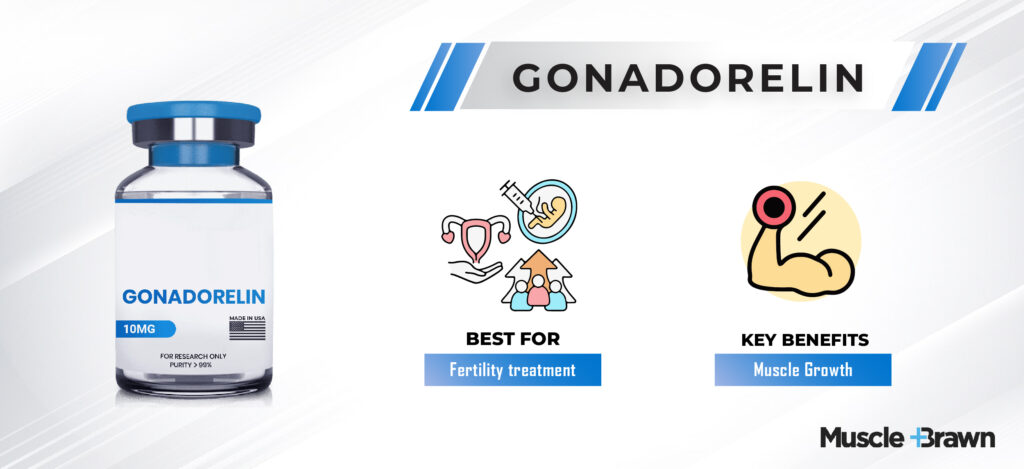
Gonadorelin, sometimes hailed as the “hormone whisperer,” plays a pivotal role in the realm of medicine and wellness.
This synthetic form of the natural hormone GnRH (Gonadotropin-Releasing Hormone) is primarily used to kickstart the body’s hormone production system.
It’s a key player in fertility treatments, helping individuals struggling to conceive by stimulating the release of crucial reproductive hormones like LH (Luteinizing Hormone) and FSH (Follicle-Stimulating Hormone) [3].
Additionally, athletes and bodybuilders turn to Gonadorelin to naturally boost testosterone levels, fostering muscle growth and vitality.
This versatile hormone stimulator has the power to rekindle the dormant potentials within, making it a sought-after solution for those seeking hormonal balance and optimal well-being.
Gonadorelin for Sale
Gonadorelin is a synthetic version of gonadotropin-releasing hormone (GnRH), a hormone naturally produced in the hypothalamus.
It plays a crucial role in regulating the production and release of luteinizing hormone (LH) and follicle-stimulating hormone (FSH) from the pituitary gland, both of which are vital for normal functioning of the ovaries and testes.
For women experiencing issues with ovulation, Gonadorelin assists in regulating the menstrual cycle and enhancing the chances of conception.
In men, it’s particularly used when hypogonadism is suspected or needs to be managed, ensuring appropriate testosterone and sperm production levels.
Gonadorelin can be employed in the management of hypogonadism – a condition characterized by low sex hormone production.
It is also utilized diagnostically to assess pituitary gland functionality by observing its ability to secrete LH and FSH in response to Gonadorelin.
Gonadorelin Overview
 Top Benefits: Increases GnRH, useful in treating fertility issues and hypogonadism
Top Benefits: Increases GnRH, useful in treating fertility issues and hypogonadism Form: Injectable liquid
Form: Injectable liquid Max Time Used: 6 – 8 Weeks
Max Time Used: 6 – 8 Weeks Average Cost: $79 /10mg
Average Cost: $79 /10mg Side Effects: Allergic reaction, headaches, soreness at injection site
Side Effects: Allergic reaction, headaches, soreness at injection site Dangers: Misuse/overuse can lead to potential hormonal imbalances and related health issues
Dangers: Misuse/overuse can lead to potential hormonal imbalances and related health issues Go to the Full review
Go to the Full review
- Supports fertility
- Manages hypogonadism
- Pain at the injection site
- May induce headaches, light-headedness, or allergic reactions
Exploring HCG: Beyond Fertility and Weight Loss
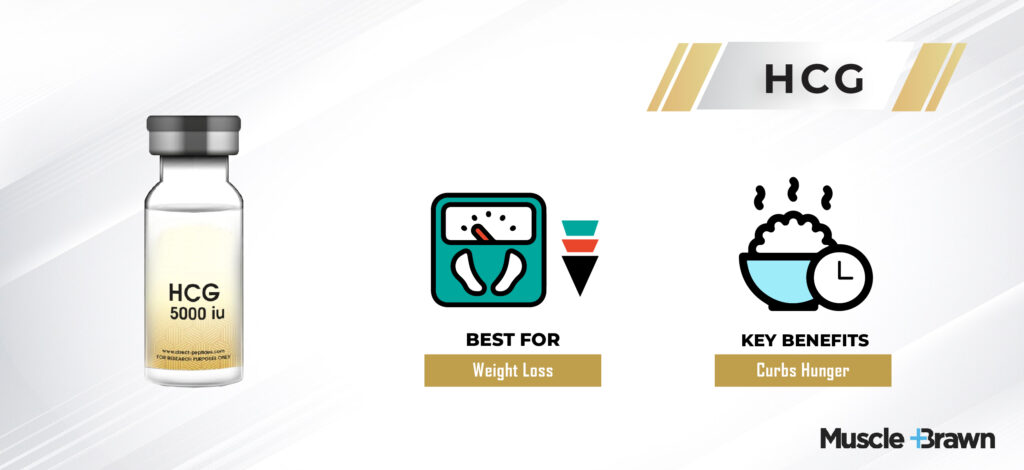
Often dubbed the “weight loss miracle” and the “fertility superhero,” Human Chorionic Gonadotropin (HCG) is a hormone that wears many hats in the world of medicine and wellness.
Primarily known for its role in confirming pregnancy, HCG boasts an array of diverse applications.
It’s a pivotal component in fertility treatments, assisting both women and men in their journey to parenthood.
Furthermore, HCG has garnered attention as an aid for weight loss, as it curbs hunger while promoting fat metabolism [4].
In the realm of hormone replacement therapy, HCG helps maintain testosterone production and preserve fertility in men.
With its multifaceted benefits, HCG proves that sometimes, one hormone can indeed do it all.
HCG for Sale
HCG is a glycoprotein that consists of 237 amino acids. It’s composed of two subunits: Alpha (α) subunit (Identical to the alpha subunits of other hormones like LH, FSH, and TSH) and Beta (β) subunit (Unique to HCG and provides its specific hormonal functionality).
It is notably utilized in the medical field for various therapeutic applications, primarily revolving around fertility and hormonal management.
It aids in fertility as HCG is utilized to trigger ovulation and to support the maturation of eggs in women undergoing assisted reproductive technologies like IVF.
In males, HCG is employed to stimulate testosterone production and sperm generation, especially in cases of hypogonadism or fertility challenges.
It is also used as a treatment of delayed puberty to stimulate testicular development in boys experiencing delayed puberty.
To help with weight loss, the HCG diet combines HCG injections with a very low-calorie intake to pursue rapid weight loss.
HCG Overview
 Top Benefits: Facilitation of ovulation in women, supports male fertility, treatment of hypogonadism
Top Benefits: Facilitation of ovulation in women, supports male fertility, treatment of hypogonadism Form: Injectable liquid
Form: Injectable liquid Max Time Used: Few months to a year
Max Time Used: Few months to a year Side Effects: Misuse can cause hormonal imbalances and associated risks, such as undue stress on metabolic processes
Side Effects: Misuse can cause hormonal imbalances and associated risks, such as undue stress on metabolic processes Dangers: Severe OHSS, a rare but potentially life-threatening condition if used inappropriately in fertility treatments
Dangers: Severe OHSS, a rare but potentially life-threatening condition if used inappropriately in fertility treatments Go to the Full review
Go to the Full review
- Facilitates ovulation
- Supports fertility
- Treats hypogonadism
- Soreness or redness at the injection site
- Headaches, mood fluctuations, and fatigue
Gonadorelin vs HCG: Understanding Their Distinct Roles
Gonadorelin Peptide Therapy
Gonadorelin, also known as Gonadotropin-Releasing Hormone (GnRH), is a masterful orchestrator of our reproductive system.
Its mechanism of action revolves around a complex yet elegant dance within the body’s endocrine system.
When administered, Gonadorelin stimulates the hypothalamus, a crucial gland in the brain, to release pulsatile bursts of GnRH.
This pulsatile pattern is essential because it governs the secretion of two vital hormones, luteinizing hormone (LH) and follicle-stimulating hormone (FSH), from the pituitary gland.
LH and FSH, in turn, set in motion the intricate machinery of the gonads (testes in males, ovaries in females) [5].
In men, this cascade results in the release of testosterone, while in women, it triggers ovulation and supports the menstrual cycle.
By manipulating this delicate hormonal symphony, Gonadorelin can be harnessed for various therapeutic purposes, from treating infertility to managing hormone imbalances, making it a potent tool in the realm of reproductive medicine.
HCG Hormone Therapy
Human Chorionic Gonadotropin (HCG) exerts its remarkable influence by mimicking the actions of luteinizing hormone (LH) in the body.
Produced in abundance during pregnancy, HCG’s primary role is to support the corpus luteum, a temporary endocrine gland formed after ovulation. This gland, in turn, secretes progesterone, vital for maintaining a pregnancy.
Beyond its pregnancy-related functions, HCG showcases its versatility by stimulating the gonads in both men and women.
In women, it prompts the release of eggs during ovulation, essential for conception. In men, HCG acts as a surrogate for LH, stimulating the testes to produce testosterone, thus preserving fertility during hormone replacement therapy or after anabolic steroid use [6].
Additionally, HCG is renowned for its role in weight loss programs. It helps curb appetite while encouraging the body to use stored fat for energy, making it an essential component of various diet regimens.
HCG’s adaptability, simulating essential hormones in different contexts, underscores its pharmacological significance.
Applications and Potential Uses of Gonadorelin
Treatment of Hypogonadotropic Hypogonadism
Hypogonadotropic hypogonadism is a condition marked by insufficient gonadal function due to deficient gonadotropin-releasing hormone (GnRH) secretion. Gonadorelin emerges as a vital therapeutic tool in rectifying this hormonal imbalance.
When administered, Gonadorelin stimulates the pituitary gland to release luteinizing hormone (LH) and follicle-stimulating hormone (FSH).
This hormonal surge jumpstarts the development of secondary sexual characteristics and reinstates fertility, addressing the core issue of inadequate gonadal activity.
This treatment offers a promising avenue for individuals grappling with the challenges of hypogonadotropic hypogonadism.
Diagnosis of Pituitary Disorders
Gonadorelin also plays a pivotal role as a diagnostic agent for evaluating pituitary function.
Its administration aids in the differentiation between hypothalamic and pituitary causes of hypogonadism.
By observing the pituitary gland’s response to Gonadorelin, healthcare professionals can pinpoint the root cause of hormonal irregularities, facilitating accurate diagnosis and tailored treatment strategies.
Ovulation Induction
In the realm of assisted reproductive technologies, Gonadorelin serves as a potent tool for inducing ovulation in women undergoing fertility treatments.
By prompting the release of LH and FSH, critical for follicle maturation and ovulation, Gonadorelin enhances the chances of successful conception.
This application underscores its significance in the pursuit of parenthood for those facing fertility challenges.
Prostate Cancer Treatment
Emerging research has explored the potential of Gonadorelin analogs in managing prostate cancer.
These analogs, by curbing testosterone production, offer a means to slow the proliferation of prostate cancer cells.
This avenue of investigation holds promise in expanding the therapeutic options available for individuals battling this malignancy [6].
Central Precocious Puberty (CPP)
Gonadorelin analogs have found a niche in the treatment of central precocious puberty (CPP).
This condition entails the premature onset of puberty in children due to the untimely activation of the hypothalamic-pituitary-gonadal axis.
By regulating this axis, Gonadorelin analogs help delay the onset of puberty, affording affected children a more typical developmental trajectory and improved quality of life.
Applications and Potential Uses of HCG
Fertility Treatment
HCG plays a pivotal role in fertility treatments, particularly in assisted reproductive technologies like in vitro fertilization (IVF) and intrauterine insemination (IUI).
In these procedures, HCG is administered to women to induce and precisely time ovulation. By mimicking the natural luteinizing hormone (LH) surge, HCG stimulates the release of mature eggs from the ovaries.
This well-timed ovulation maximizes the chances of successful fertilization when paired with other fertility interventions, offering hope to couples struggling with infertility.
Hypogonadism in Men
For men facing hypogonadism, a condition marked by insufficient testosterone production, HCG serves as a valuable therapeutic tool. By mimicking LH’s action, HCG stimulates the testes to produce testosterone.
This not only alleviates symptoms of low testosterone, such as fatigue and reduced libido but also preserves fertility, which is often compromised in men with hypogonadism.
Cryptorchidism
In cases of cryptorchidism, where one or both testicles fail to descend into the scrotum during infancy, HCG therapy may be employed.
HCG is administered to promote testicular descent, a critical step in ensuring proper development of the testicles and potentially preventing future fertility issues [7].
Weight Loss
HCG’s use in weight loss remains highly controversial and lacks approval from regulatory agencies. Nevertheless, some weight loss clinics incorporate HCG into low-calorie diet plans.
The rationale is that HCG may help suppress appetite and enhance fat metabolism, potentially aiding in weight loss efforts. However, the scientific community widely questions the efficacy and safety of this approach.
Diagnostic Tool
HCG is an essential diagnostic tool for confirming pregnancy. It is detectable in both urine and blood and serves as a reliable marker for pregnancy testing.
This widespread use of HCG in pregnancy diagnostics underscores its importance in modern healthcare [8].
Safety, Dangers, and Regulatory Considerations of Gonadorelin vs HCG
Considerations for HCG
Human Chorionic Gonadotropin (HCG) is generally safe when used under medical supervision for its approved indications, such as fertility treatment.
However, using HCG for off-label purposes, like weight loss, can pose risks. Potential side effects may include headaches, fatigue, and mood swings, while misuse can lead to electrolyte imbalances, which can be dangerous.
The primary danger of HCG is its misuse for rapid weight loss, which is not supported by robust scientific evidence.
Extreme calorie restriction combined with HCG can lead to malnutrition, electrolyte imbalances, and other health complications.
Additionally, obtaining HCG from unregulated sources carries the risk of receiving counterfeit or impure products.
HCG is subject to regulatory oversight in most countries. Its use for fertility treatment and certain medical conditions is approved, but its use for weight loss is often controversial and may face regulatory restrictions or warnings against off-label use.
Considerations for Gonadorelin
Gonadorelin, or GnRH, is generally considered safe when used as directed by healthcare professionals.
Side effects are typically mild and may include redness or pain at the injection site.
Prolonged use can lead to desensitization of the pituitary gland, which may affect its responsiveness to the hormone.
The main danger associated with Gonadorelin is the potential for overstimulation of the gonads, leading to excessive hormone production.
This can be avoided by careful monitoring and adjustment of the treatment regimen.
Additionally, misuse or self-administration without medical supervision can lead to inappropriate hormonal changes and health risks.
Gonadorelin is a regulated medication approved for various medical applications, including fertility treatment and the diagnosis of pituitary disorders.
Its use is typically restricted to healthcare settings to ensure proper administration and monitoring. Compliance with regulatory guidelines is essential to minimize risks and ensure safe and effective use.
Factors To Remember When Buying Peptides
- Seek a medical evaluation and prescription from a qualified healthcare provider to ensure these medications are appropriate for your specific medical needs.
- Obtain the prescribed HCG or Gonadorelin from a licensed pharmacy or medical facility. These medications are typically dispensed under medical supervision.
- Adhere to local regulations, as HCG and Gonadorelin may have specific legal restrictions depending on your location.
- Avoid purchasing these medications from unregulated online sources, as they may provide counterfeit or unsafe products.
- Follow your healthcare provider’s instructions meticulously to ensure safe and effective use.
In Summary
In the intricate world of peptides, the battle between HCG and Gonadorelin has been unmasked. HCG, with its versatile roles, and Gonadorelin, the regulator of fertility, stand as pillars of hormonal balance.
As this Peptide Guide illuminates, both peptides wield unique powers. Yet, the choice between them hinges on your health journey’s specific terrain.
Whether seeking fertility enhancement or hormonal equilibrium, understanding their distinctions is your compass to a vibrant, healthier future.
So, embrace the power of peptides, and let your path to well-being be guided by knowledge.

